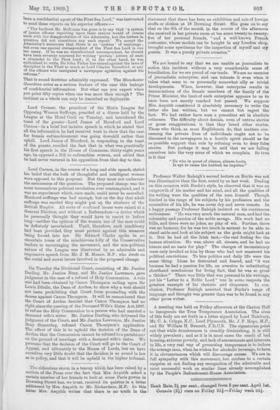Professor Walter Raleigh's second lecture on Burke was not less
illuminative than the first, noted by us last week. Dealing on this occasion with Burke's style, he observed that it was an outgrowth of his matter and his mind, and all the qualities of his writing were the qualities of the man himself. Though limited in the range of his subjects by his profession and the necessities of his life, he was never dry and never remote. In a happy passage Professor Raleigh insisted on his continuous seriousness. "He was very much the natural man, and had the solemnity and passion of the noble savage. His work had no frills, and there were no jokes, no play of wit. Further, there was no humour, for he was too much in earnest to be able to stand aside and look at his subject as the gods might look at it. But he had all the Irish tact,—the real feeling for the human situation. He was, above all, sincere, and he had no leisure and no taste for play." The charges of inconsistency were only levelled at him by those who had not mastered his political convictions. To him politics and daily life were the same thing. Ideas he distrusted and feared, and "it was because he had a passion for life, an aversion to substituting shorthand conclusions for living fact, that he was so great' a thinker." There was little that was personal in his writings, yet his "Letter to a Noble Lord" was in some respects the greatest example of his rhetoric and eloquence. In con- clusion, Professor Raleigh asserted that Burke's range of language and thought was greater than was to be found in any other prose writer.










































 Previous page
Previous page